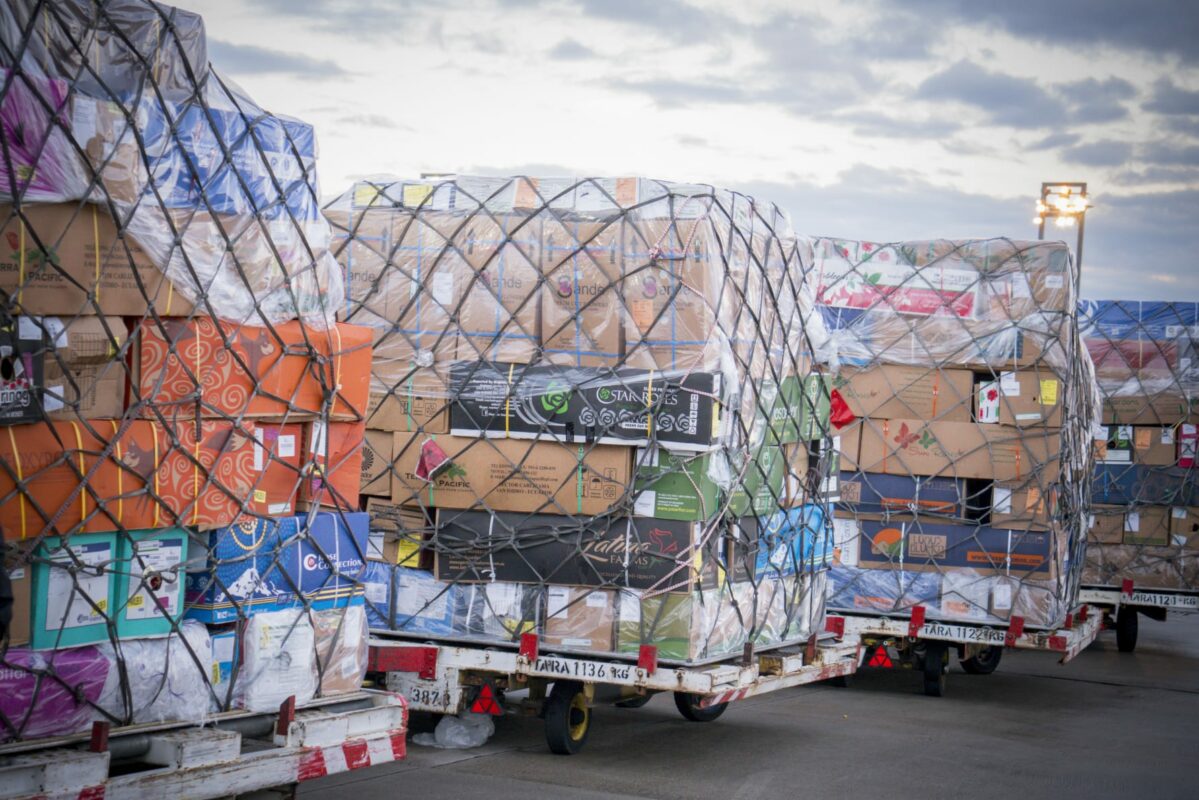All significant information in a nutshell: the team of the Silicon Economy project entitled »Digitalization of Import Processes in Perishable Air Freight Logistics« developed a standards-compliant solution for import forwarders at airports that significantly simplifies the workflow for handling perishable goods (»Perishables«).
Whether there are avocados from Peru, steaks from Argentina or roses from Kenia: the import of such perishable goods means a lot of work for the so-called import-agents. It is them who check and process the freight and delivery documents at airports, who ensure compliance with country-specific specifications and official quality requirements, and declare the goods. The time factor is always breathing down their necks: every hour, every day that perishable goods are »stuck« at the airport costs freshness – and therefore money. However, the import agents often have to run after important data and information from the goods‘ countries of origin. It is exactly this problem that the development project titled “Digitization of Import Processes in Airfreight Fresh Logistics”, abbreviated to »PERImport«, addressed as part of the Silicon Economy.

In Spring 2020, researchers at Fraunhofer IML received a request from the ACDC digitalization group, short for Air Cargo Digitisation Catalyst, of the Frankfurt Airport Air Cargo Community. »The task was how to simplify the workflow for the import forwarder?«, says Emanuel Skubowius from »PERImport«. At Frankfurt Airport alone, the Perishable Center Frankfurt (PCF) stores and handles 120,000 tons of perishable goods per year. Skubowius says: »It is true that all processes for importing perishable goods are routine processes, however, every routine – there is no other way to put it – is still inefficient today.«
On the one hand, the necessary accompanying documents are largely available only in analog form, on the other hand, the infrastructure for import processes is extremely fragmented. The consequence is: in order to be able to declare goods, the import forwarder has to gather information from various sources – from e-mails to faxes. In addition to the actual documents, there are sometimes a dozen updates per shipment in terms of electronic messages or faxes in which partners from the countries of origin of the goods make additional declarations, refer to special cases or report malfunctions. »It was our idea to develop a dashboard which gives the import forwarder all the information that are required to accept goods at site and send them on. The days of e-mails here and faxes there should finally be a thing of the past«, says Skubowius‘ teammate Oliver Ditz from the Silicon Economy. The main work for the information that is in the dashboard will be done in the country of origin even before the departure.
Standard compliant solution
The Silicon Economy research team built a solution in about half a year so that handling processes can now be largely paperless. An important task was to design the solution in a standard compliant way. Part of it was the connection of the dashboard to the European Union TRACES platform. The online platform is used in about 90 countries worldwide for the issuing of health and phytosanitary certificates and official documents required for the import, export and trade of animals and goods. TRACES aims at simplifying and accelerating the certification process and all related entry procedures. At the same time, the data was prepared in accordance with data sharing standard ONE record of the International Air Transport Association (IATA).
The team continuously tested the components developed in the project together with, for example, the practical partners Sotracom Air Transit, Lufthansa Cargo AG and Perishable Center Frankfurt. Sotracom, an international import forwarder with head office in Paris and locations in Germany, Belgium and Spain, has decades of expertise in importing and exporting perishable goods. Sotracom’s agencies are responsible for handling 150,000 tons of goods worldwide per year. The company is also located at Frankfurt Airport. Using the (fictitious) example of a shipment of roses from Kenya, the researchers and Sotracom’s import agents went through the process of how the goods would be redistributed from the plane. The result shows: »Our software works and is now hungry for data«, smile the Silicon Economy experts Ditz and Skubowius.
The solution is widely supported in the industry: »All participating partners find it important. In the end, everyone benefits from an improvement of the overall process«, says Oliver Ditz. In particular, the open source approach of the researchers, shaped by the Silicon Economy, ensures the necessary acceptance: the solution is transparent, open and can be expanded. Therefore, it will contribute considerably to the further standardization of import processes.
The next dimension of digitalization
The logistics data platform logistics.cloud, which arose from a joint project between large, German-based industrial companies and global logistics companies such as Schaeffler, Schenker and Lufthansa Cargo, has already signaled interest in the solution and intends to make it available to import agents. Ditz and Skubowius say: »There are positive signs that the dashboard will soon be put into operation at many import forwarders!« This applies not only to Frankfurt Airport, but also to all other airports, at least in Europe. For the processes are largely similar everywhere due to specifications laid down by the authorities.
The two Silicon Economy researchers have already thought about expansion stages: »It would be even smarter, if the information would not only be transmitted with the physical goods on departure, but digitally in parallel – at best, of course, only digitally. Then, the import agent can map the complete process via a tablet. That would be the next dimension of digitalization.«
Photo: Patrick Kuschfeld/Lufthansa Cargo AG
Illustration: Fraunhofer IML